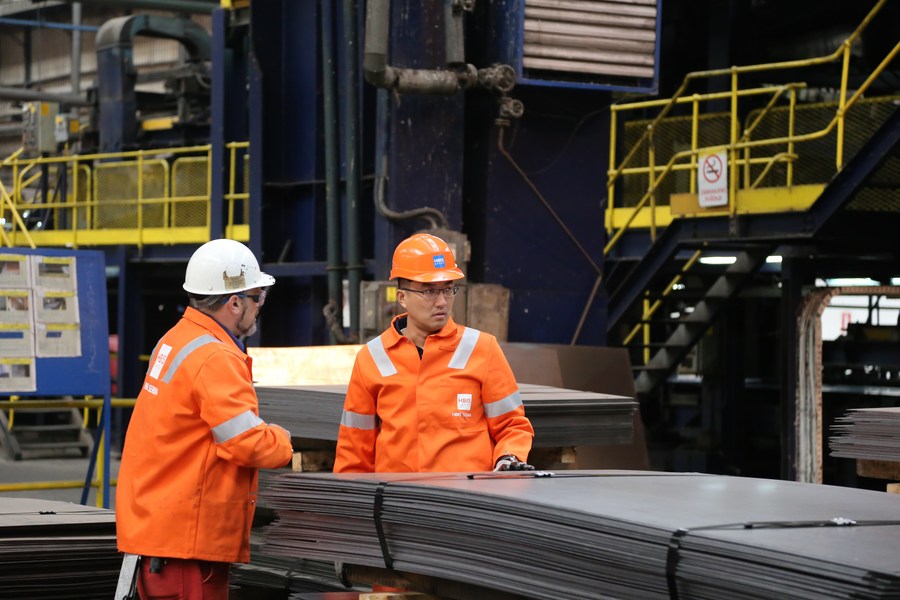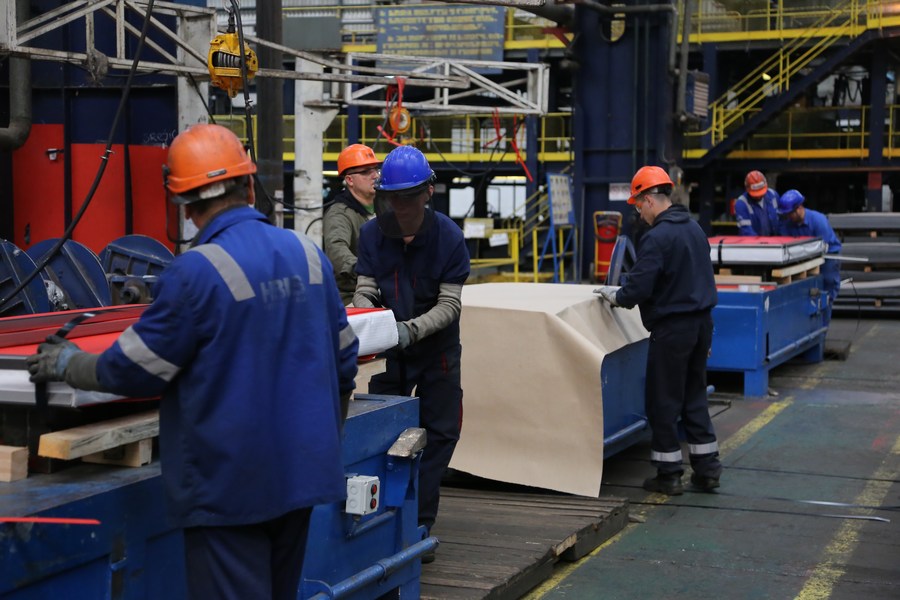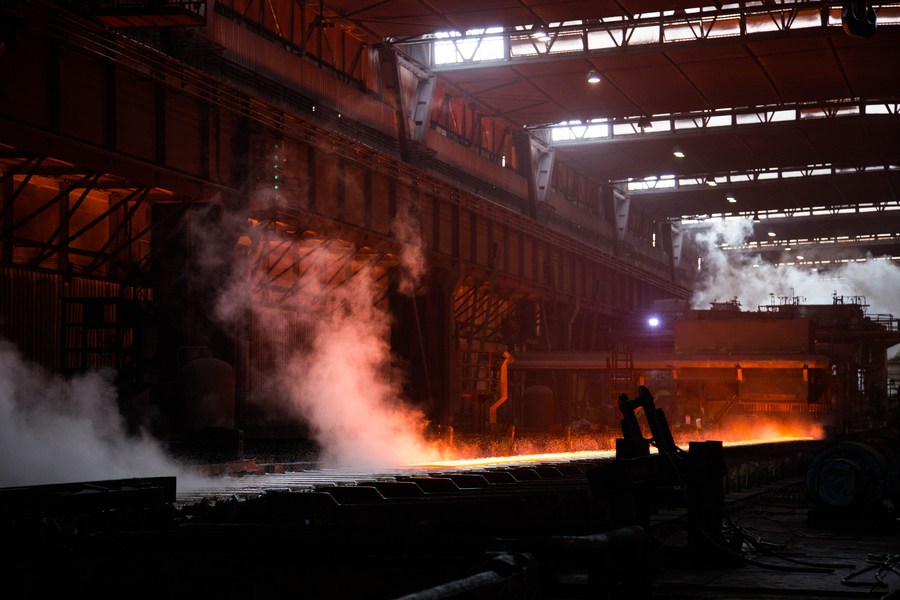A Chinese investment welcomed by Serbia, but defamed by Western media
-- A steel mill in Serbia has been reinvigorated with the help of a Chinese company.
-- Five years after having been purchased by China's HeSteel Group (HBIS), the steel mill has become the country's second-biggest exporter.
-- The unexpected bond with China has breathed fresh life to the Smederevo factory, not only in production, but also in environmental protection efforts.
BELGRADE, Jan. 8 (Xinhua) -- Several years ago, fierce market competition and management problems plunged the Smederevo steel mill in central Serbia into the verge of bankruptcy.
After a Chinese company purchased the mill in 2016, things have changed: thousands of jobs have been saved, and its production capacity and environmental performance greatly improved.
However, such a model of Belt and Road cooperation widely welcomed by the locals has been constantly smeared by the Western media.

Aerial photo taken on Aug. 16, 2021 shows the HBIS Serbia in Smederevo, Serbia. (HBIS Serbia/Handout via Xinhua)
CARELESS MISTAKE OR SMEAR CAMPAIGN
A recent Reuters report, titled "Chinese-owned steel mill coats Serbian town in red dust; cancer spreads," quoted "data from the Smederevo public health body, which a watchdog called Tvrdjava obtained through a freedom of information request and shared with Reuters," saying "the municipality of around 100,000 people reported 6,866 cancer cases in 2019, up from 1,738 in 2011."
And it reached a conclusion: "cancer rates have quadrupled in under a decade," which is a mistake confirmed by Xinhua reporters who verified official data, statements of relevant stakeholders and sources mentioned by Reuters.
The Smederevo public health body confirmed to Xinhua in emails that the statistics used by Reuters "represents the morbidity (illness) of all patients who reported to the doctors in 2019, even those on treatment diagnosed from earlier years," suggesting that the "6,866" cases could include patients registered in 2011.
In other words, the figure is not cancer incidence -- the rate of new cases of cancer in a year, as Reuters intended to persuade its readers to believe.
Smederevo health authorities also insisted that the statistics used by Reuters "cannot be compared/used for analysis."
In 2016, China's HeSteel Group (HBIS) purchased the Smederevo Steelworks for 46 million euros (51.9 million U.S. dollars), and established HBIS Serbia. The plant, which had been losing money for seven consecutive years until then, started to expand production and improve environmental performance.

A Serbian worker (L) talks with a Chinese engineer at a workshop of HBIS Serbia in Smederevo, Serbia, Oct. 10, 2019. (Xinhua/Shi Zhongyu)
Meanwhile, the watch dog, Tvrdjava, as Reuters mentioned is found to have connection with the U.S. Agency for International Development. The Washington-based agency has a bad reputation for interfering in other countries' internal affairs under the White House's instructions, such as plotting regime change in Venezuela.
As part of its efforts to contain China's development, the U.S. Senate adopted the United States Innovation and Competition Act in June, 2021, demanding that the U.S. government "support civil society and independent media" and "train journalists on investigative techniques" to "ensure public accountability related to the Belt and Road Initiative."
However, the U.S. government has taken action before the act is signed into law. Zimbabwe's largest daily newspaper The Herald published a report in September last year, revealing that Washington is funding and training local reporters to write anti-China stories and discredit Chinese investments. Journalists could receive 1,000 dollars for every fake story from the U.S. embassy through its proxy.
LOCAL SUPPORT
For many local residents, the Smederevo steel mill was considered "the pride of Serbia" as it was the only state-owned steelworks in the country.
It was taken over by U.S. Steel Corporation in 2003, and was sold back to the Serbian government in 2012 for 1 dollar as the factory was in deep trouble.
Five years after the establishment of HBIS Serbia, the steel mill has become the country's second-biggest exporter. Data of the Serbian Ministry of Finance showed that in the first half of 2021, the factory's export value exceeded 304 million dollars.

Serbian employees work at a workshop of HBIS Serbia in Smederevo, Serbia, Oct. 10, 2019. (Xinhua/Shi Zhongyu)
Daniel Glavas, a worker of HBIS Serbia, said that tremendous changes have taken place since HBIS' arrival. "At that time, we had no future, and we didn't know what the future would be like. Since the arrival of the new management, we have received guarantees on our positions and salaries."
"The fact that HBIS employs about 5,200 people, that about 20,000 more people work indirectly thanks to the ironworks, and that it is the first exporter in the country tells you enough about how important it is for the state economy and employment rate in our city," Jovan Bec, mayor of Smederevo, told Xinhua.
He stressed that a lot has been done to prevent dust pollution in settlements surrounding the steelworks.
According to the Serbian Environmental Protection Agency (SEPA), the air pollution in Smederevo has been decreasing since the steelworks got its new owner.
The number of days with pollutant levels above the threshold dropped by more than 40 percent in 2020 compared with the year of 2011, and pollutant concentrations decreased on a daily basis, Tamara Perunovic Culic, assistant director of SEPA, told Xinhua in an interview.
The average concentration of PM10 particles dropped from 113 micrograms per cubic meter in 2019 to 76 micrograms in 2020, while the concentration of PM2.5 particles dropped from 75 micrograms per cubic meter in 2019 to 57 in 2020, according to SEPA.
According to HBIS, the figures continued to decrease in 2021: the average daily concentration of PM10 particles was 43 micrograms per cubic meter, while the concentration of PM2.5 particles decreased to 30 micrograms per cubic meter, both of which are below 50 micrograms per cubic meter as requested by the Serbian government.
"Air quality is constantly monitored at two measuring points in (villages of) Ralja and Radinac throughout the year and HBIS bought an automatic measuring station which was handed over to SEPA and placed in the village of Radinac," said the mayor.
Ljubica Drake, general manager of environmental protection at HBIS Serbia, told Xinhua that the top management of HBIS is "surprisingly" dedicated to environmental protection.
"When HBIS first came here in 2016, we mustn't forget that this plant did business in very difficult circumstances," and it was a priority then to put all these environment protection systems into operation, he said.
So far, HBIS has invested 339 million dollars to upgrade its equipment. Its long-term plan "will create true progress in the protection of the environment," Drake said.

Photo taken on May 17, 2021 shows a steelmaking workshop at the HBIS Serbia in Smederevo, Serbia. (Xinhua/Shi Zhongyu)
HBIS Serbia's "presence is important for Smederevo because it provides living and working conditions for many families, gives children the opportunity to go to school, and young people do not leave their hometown but stay in it and realize themselves in all fields of life," Bec said.
For Vladan Mihailovic, executive director for production at the steel mill, the plant's success is admirable. "Can you imagine that? In just 5.5 years, a plant that was just several weeks or months away from being shut down, is becoming one of the best plants in Europe."
Photos
Related Stories
- Chinese investment spurs Africa's transformation agenda: experts
- Major direct investments by China will contribute to South African Economic Development: report
- Chinese investments in Australia declined by 36.3 percent in 2018: report
- China’s 'glass king' blasts profile of company's troubles in US as fake news
- Kenya holds China Trade Week to attract Chinese investment
- Anticipating more Chinese investment in Spain's club: former Spanish PM
- China loosens outbound investment control
- China, EU in need of raising mutual investment
- Greek Ambassador vows to deepen cooperation and exchanges with China
- Bright prospects for BRICS cooperation
Copyright © 2022 People's Daily Online. All Rights Reserved.










